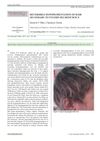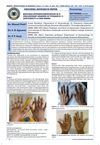4 citations,
March 2020 in “JAAD Case Reports” Vitamin B12 deficiency can cause darkening of all nails.
 1 citations,
January 2013 in “Nasza Dermatologia Online”
1 citations,
January 2013 in “Nasza Dermatologia Online” Vitamin B12 deficiency can cause reversible hair color loss in children.

Premature graying of hair is linked to vitamin D and B12 deficiencies, thyroid issues, iron imbalance, stress, and lifestyle habits, and affects quality of life.
[object Object]  63 citations,
May 2017 in “American Journal of Clinical Dermatology”
63 citations,
May 2017 in “American Journal of Clinical Dermatology” People with alopecia areata often have lower levels of vitamin D, zinc, and folate, but more research is needed to understand if supplements can help treat it.
20 citations,
January 2016 in “International journal of trichology” Young Indians with premature graying often have lower levels of certain nutrients and unhealthy lifestyles.
 10 citations,
August 2021 in “Journal of Cosmetic Dermatology”
10 citations,
August 2021 in “Journal of Cosmetic Dermatology” Most patients with telogen effluvium had low iron and vitamin D levels; iron supplements were commonly prescribed.
 19 citations,
March 2021 in “Obesity surgery”
19 citations,
March 2021 in “Obesity surgery” Many people experience hair loss after weight loss surgery, especially younger women, and it's linked to lower levels of zinc, folic acid, and ferritin.
 1 citations,
August 2018 in “Journal of The American Academy of Dermatology”
1 citations,
August 2018 in “Journal of The American Academy of Dermatology” Teledermatology could improve skin care access, but its success depends on technology, quality strategies, and payment policies; also, vitamin B12 might help treat a specific hair loss condition.
 35 citations,
January 2013 in “International Journal of Trichology”
35 citations,
January 2013 in “International Journal of Trichology” Kids with early graying hair often have low levels of calcium, ferritin, and vitamin D3.
 March 2002 in “Clin-Alert”
March 2002 in “Clin-Alert” In 2002, various drugs caused serious side effects, including vitamin B12 deficiency, heart issues, blindness, hypersexuality, allergic reactions, blood clotting problems, pupil dilation, capillary leak syndrome, muscle breakdown, hepatitis, skin reactions, and lupus.
15 citations,
November 2009 in “Journal of diabetes and its complications” Patients with Type 1 diabetes should be screened for pernicious anemia.
 1 citations,
April 2021 in “Deneysel ve klinik tıp dergisi/Journal of experimental and clinical medicine”
1 citations,
April 2021 in “Deneysel ve klinik tıp dergisi/Journal of experimental and clinical medicine” Women with PCOS have a higher risk of metabolic syndrome and need lifestyle changes and treatment.
 1 citations,
January 2021 in “Turkish Journal of Medical Sciences”
1 citations,
January 2021 in “Turkish Journal of Medical Sciences” Women with telogen effluvium should be tested first for vitamin and mineral deficiencies.
 134 citations,
December 2018 in “Dermatology and Therapy”
134 citations,
December 2018 in “Dermatology and Therapy” Some vitamins and minerals like vitamin D and iron can help with certain types of hair loss, but more research is needed for others.
 17 citations,
May 2018 in “Journal of Cosmetic Dermatology”
17 citations,
May 2018 in “Journal of Cosmetic Dermatology” Most women in the study lost hair due to chronic shedding, with stress and nutrient deficiencies being common factors.
16 citations,
January 2018 in “International journal of trichology” Genetics and nutritional deficiencies are key factors in premature graying of hair.
 5 citations,
December 2020 in “BMC Dermatology”
5 citations,
December 2020 in “BMC Dermatology” Bariatric surgery improves skin conditions and metabolism but may cause nutritional deficiencies and hair loss.
 5 citations,
January 2006 in “Journal of obstetrics and gynaecology”
5 citations,
January 2006 in “Journal of obstetrics and gynaecology” Metformin can cause hair loss in some women with PCOS.
 18 citations,
April 2021 in “Experimental Dermatology”
18 citations,
April 2021 in “Experimental Dermatology” COVID-19 may cause hair loss and scalp pain due to inflammation and changes in hair follicle receptors, but these symptoms typically resolve in 2 to 4 months.
 3 citations,
January 2017 in “Journal of Pakistan Association of Dermatology”
3 citations,
January 2017 in “Journal of Pakistan Association of Dermatology” Women with certain types of hair loss may have low iron levels, and iron supplements could help.
 January 2012 in “Vitamins & trace elements”
January 2012 in “Vitamins & trace elements” Smoking and drinking can lower vitamin levels and potentially trigger early hair loss, but overall vitamin levels don't seem to affect hair loss duration.
 December 2022 in “Cureus”
December 2022 in “Cureus” Low iron levels are linked to hair loss in women.
 2 citations,
December 2015 in “International Journal of Dermatology”
2 citations,
December 2015 in “International Journal of Dermatology” Washing test helps identify hair loss type, low iron levels significant.
 July 2021 in “PARIPEX INDIAN JOURNAL OF RESEARCH”
July 2021 in “PARIPEX INDIAN JOURNAL OF RESEARCH” Knuckle darkening can be an early sign of vitamin B12 deficiency.
 239 citations,
July 2002 in “Clinical and Experimental Dermatology”
239 citations,
July 2002 in “Clinical and Experimental Dermatology” Low iron and L-lysine levels can cause hair loss in women, and increasing these nutrients can reduce hair shedding.
 January 2025 in “Journal of the Egyptian Womenʼs Dermatologic Society”
January 2025 in “Journal of the Egyptian Womenʼs Dermatologic Society” Higher substance P levels may cause discomfort in hair loss patients.
 December 2019 in “bioRxiv (Cold Spring Harbor Laboratory)”
December 2019 in “bioRxiv (Cold Spring Harbor Laboratory)” Redheaded people have higher levels of a vitamin D precursor, suggesting red hair may be an adaptation for better vitamin D synthesis in areas with less sunlight.
 29 citations,
January 1993 in “Dermatologic Clinics”
29 citations,
January 1993 in “Dermatologic Clinics” Certain medications and maintaining adequate iron levels can help manage women's hair loss.
 1 citations,
November 2015 in “Indian Journal of Clinical Biochemistry”
1 citations,
November 2015 in “Indian Journal of Clinical Biochemistry” The conference presented findings on how vitamin D levels, genetic factors, and lifestyle choices like smoking and yoga affect various health conditions and diseases.
[object Object]  240 citations,
February 2005 in “Diabetes Care”
240 citations,
February 2005 in “Diabetes Care” Patients need long-term care after bariatric surgery to manage potential nutritional and metabolic issues.

























